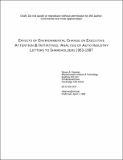Effects of Environmental Change On Executive Attention & Initiatives: Analysis of Auto Industry Letters To Shareholders 1963-1987
Author(s)
Freeman, Steven A.
DownloadFreeman1.pdf (163.2Kb)
Metadata
Show full item recordAbstract
The ability of organizations to adapt to environmental change has been a central question of
organization theory since the origins of the field, but fundamental theoretical confusion remains:
Organizational scholars see widely divergent patterns, running the gamut from neo-classical
economists who see efficient diffusion of adaptive practices to organizational ecologists who view
organizations as unchanging even in the face of environmental change. These and several other
apparently contradictory schools of thought -- contingency theory, problemistic search, threat ridigity,
and strategic choice theories -- are supported by extensive bodies of theory and empirical findings.
In this project I explore the possibility that contradictory findings may be reconciled by focus on
the timing of response. The project, a three-decade study of the automobile industry in periods of
both relative calm and severe environmental change, is motivated in part by McKinley's lament "of
the static quality of research in this area," and his call "to move toward more dynamic models."
(1993:6). I attempt to document the effect of severe environmental change upon various outcomes:
executive attention and intention, presented here, and organizational actions and products, to be
presented elsewhere.
Description
Draft Date: April 1, 1996
Date issued
2002-09-03Keywords
organization theory, environmental change